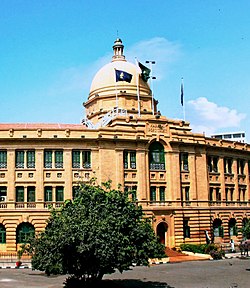world.wikisort.org - Pakistan
Kharadar (Urdu: کھارادر) is a neighbourhood in District South of Karachi, Pakistan.[1] Kharadar and the adjacent communities of Mithadar and Jodia Bazaar together form what is regarded as the original core of Karachi.
Kharadar کھارادر | |
|---|---|
Neighbourhood | |
 The Karachi Port Trust Building, completed in 1916, is located on the southern edge of Kharadar | |
| Country | Pakistan |
| Province | Sindh |
| City | Karachi |
| Government | |
| • Constituency | NA-247 (Karachi South-II) |
| • National Assembly Member | Aftab Siddiqui (PTI) |
Etymology
Kharadar literally means Brackish Gate in both Sindhi and Urdu.[2]
Location
Kharadar is located in central Karachi, near the Port of Karachi. Together with the adjacent community of Mithadar, it forms what is regarded as the original core of Karachi, when the city was known as "Kalachi Jo Goath." The combined area of the two is approximately 35 square kilometers.[3]
History

The neighbourhood was named after one of two gates to the old city of Karachi built in 1729[3] – the other being Mitha Dar or "Sweet Gate," (referring to the potable, fresh water of the Lyari River) which is now the name of the neighborhood adjacent to the northern edge of Kharadar. Both gates were torn down in 1860 after the British conquered Sindh 13 years earlier.[3]
Economy
Kharadar, along with Mithadar, is a center for Karachi's textile industry, with several garment factories and wholesalers located in the adjacent Bolton Markets, as well as numerous textile markets along Laxmi Das Street. Kharadar has also been home to a Muslim South Indian community since the 1890s – a legacy reflected in the name of the nearby market, the Cochinwala Markets named after residents of the city of Cochin in South India.
Demographics
The area is also known for its large community of Ismaili Muslims traders who originally settled in Kharadar after having moved from Kutch, Kathiawar in Gujarat in the 16th and 17th centuries – well before the British Raj. One of the earliest Ismailis in Kharadar was Syed Ghulam Ali Shah, or "Ghulmali Shah" of the Kadiwala clan, was a prominent missionary in Sindh, Kutch and Kathiawar. He died in Karachi in 1792 when there were only a handful Ismailis. Rather than being buried amongst a small community, his body was transported to Kera in Gujarat for burial. The Ismaili community grew rapidly following a famine in Kutch in 1820, during which 250 Ismailis families fled the area to settle in Kharadar, where they built their first house of worship in the Kagzi Bazar ("Paper Market") in 1825.[3] The area housed the headquarters of the Ismaili faith in Pakistan, until they were moved north to Garden. Kharadar also has a large Memon community.
Gallery
- Kharadar features narrow roads serving the densely populated neighbourhood
- Kharadar features several examples of British colonial architecture
See also
- Saddar Town
- Sindh Baloch Cooperative Housing Society
References
- Saddar Town – Government of Karachi Archived 2006-06-13 at the Wayback Machine
- CITIES: A KARACHI BY ANY OTHER NAME by Sibtain Naqvi, Dawn Newspaper, July 30, 2017
- "Kharadhar – Oldest Jamat in Karachi – Ismaili.NET – Heritage F.I.E.L.D."
External links
Другой контент может иметь иную лицензию. Перед использованием материалов сайта WikiSort.org внимательно изучите правила лицензирования конкретных элементов наполнения сайта.
WikiSort.org - проект по пересортировке и дополнению контента Википедии


